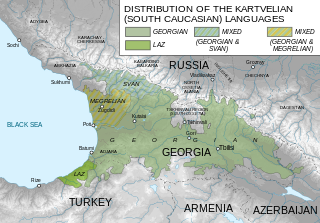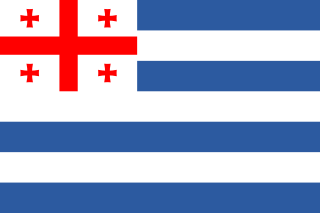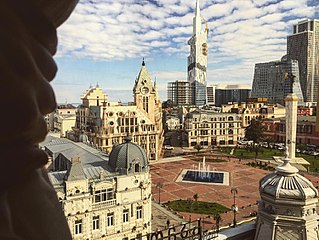
The subdivisions of Georgia are autonomous republics, regions, and municipalities.

Levan Varshalomidze is a Georgian politician and the Chairman of the Government of the Autonomous Republic of Adjara from 2004 to 2012. He assumed office on 20 July 2004, following the resignation of Aslan Abashidze—who had run the region in defiance to the central government of Georgia—during the 2004 Adjara crisis.
The Adjara crisis refers to a political crisis in Georgia's Adjaran Autonomous Republic, then led by Aslan Abashidze, who refused to obey the central authorities after President Eduard Shevardnadze's ousting during the Rose Revolution of November 2003. The crisis threatened to develop into military confrontation as both sides mobilized their forces at the internal border. However, Georgia's post-revolutionary government of President Mikheil Saakashvili managed to avoid bloodshed and with the help of Adjaran opposition reasserted its supremacy. Abashidze left the region in exile in May 2004 and was succeeded by Levan Varshalomidze.

The Adjarians are an ethnographic group of Georgians living mainly in Adjara in south-western Georgia and speaking the Adjarian dialect of the Georgian language.
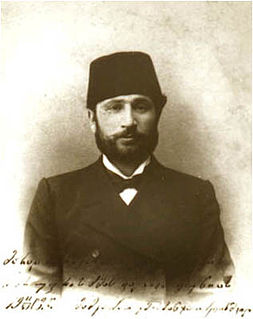
Memed Abashidze was a Georgian politician, writer and public benefactor. An eminent leader of Muslim Georgian community of Adjarians, he was a major proponent of pro-Georgian orientation in Adjara and one of the architects of the region's autonomy within Georgia. He became a victim of Joseph Stalin’s Great Purge.

Khulo is a townlet (daba) in Adjara, an autonomous republic in southwest Georgia, 88 km east of the regional capital Batumi, in the upper valley of Adjaris-tsqali. The town and adjoining 78 villages form the mountainous Khulo District (Rayon). Area – 710 km2; population – 23,327.

Khimshiashvili was a surname of the Georgian noble families, with their bases in the regions of Kakheti and Adjara. A Kakhetian family was part of the princely nobility of Georgia and, then, of the Russian Empire, while the Adjarian Khimshiashvili were important frontier beys under the Ottoman Empire and wielded noticeable influence in this part of southwestern Caucasus throughout the 19th century. The Russians rendered their family name as Khimshiyev and as Adzharsky, while to the Turks they came to be known as Hamşioğlu.

The Zan languages, or Zanuri, are a branch of the Kartvelian languages constituted by the Mingrelian and Laz languages. Some linguists consider both to be members dialects of the same, Zan, language. However, Mingrelian and Laz are not completely mutually intelligible, though speakers of one language can recognize many words of the other.
Ahmed Bey, subsequently Ahmed Paşa was a Muslim Georgian nobleman of the Khimshiashvili clan from Adjara, which he ruled as an autonomous ruler (bey) under the Ottoman Empire after 1818. He played a notable role in the Caucasian theatre of the Russo-Turkish War (1828–29) in which he failed to recapture Akhaltsikhe for the Ottomans, but checked Russian attempts to invade Adjara. Subsequently, Ahmed abandoned his earlier clandestine diplomacy with the Russians and served loyally to the Ottoman government as a commander in Kars and Erzurum. He died fighting the Kurdish insurgents in 1836.

Şerif Bey, Sherip Khimshiashvili, or Sherif-Bek Adzharsky was a Muslim Georgian nobleman (bey) of the Khimshiashvili from Adjara in the Ottoman service. He defected to the Russian Empire during the Russo-Turkish War (1877–78) and, thereby, was able to retain his property and accede to the rank of a general after the Russian takeover of Adjara.
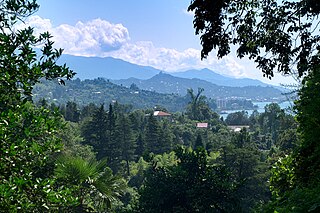
Makhinjauri is a small town (daba) in Adjara, Georgia, with the population of 735 according to the 2014 census. It is located on the Black Sea coast, 5 km north of Batumi, the capital of Adjara, and functions as a seaside resort. Until the opening of Batumi railway station in 2015, Makhinjauri station was the one serving Batumi. Administratively, Makhinjauri was part of the Khelvachauri district from 1959 to 2011 and of the city of Batumi since 2011.

Ochkhamuri is a small town (daba) on the Ochkhamuri river in Adjara, Georgia, with the population of 5,355 as of the Georgian census of 2014.
Aslan-Beg Abashidze (1877–1924) was a Muslim Georgian nobleman and general in the service of the Democratic Republic of Georgia. Like his brother Memed Abashidze, he was one of the principal champions of pro-Georgian orientation in the largely Muslim region of Adjara, heavily contested during and immediately after World War I. After Soviet takeover of Georgia in 1921, Abashidze fled to Turkey, where he died in unclear circumstances.

The Skhalta Cathedral is a Georgian Orthodox monastery and cathedral church in Adjara, Georgia, dating from the mid-13th century. It is a large hall church design, with fragments of the 14th or 15th century Paleologian-style wall painting.
Mikheil Makharadze is a Georgian politician and historian of philosophy, who was the Chairman of the Supreme Council of the Autonomous Republic of Adjara from July 20, 2004, to October 28, 2012.
The Nogaideli is a Georgian family name from the Adjara region in the south-western Georgia.
A legislative election in Adjara, an autonomous republic within Georgia, was held on October 1, 2012. Adjara elected its 18-member parliament, Supreme Council, in the region's 6th local legislative election since Georgia declared independence from the Soviet Union in 1991.
Mgeladze is a Georgian noble family. In Georgian it literally means "son of a wolf".

Zurab Pataradze is a Georgian diplomat and government official who was Chairman of the Government of the Autonomous Republic of Adjara between 15 July 2016 and 21 July 2018.
